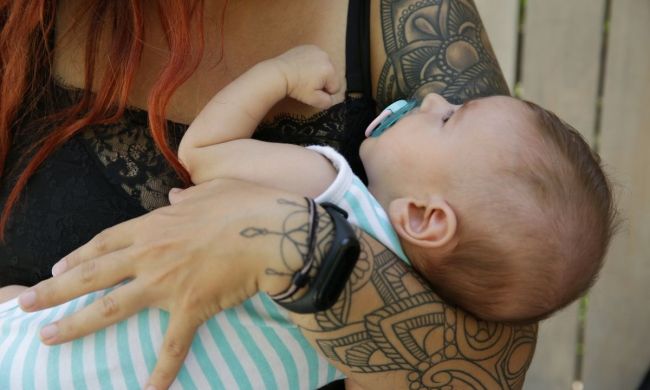You may have heard that “mouth breathing,” or breathing through the mouth instead of the nose, can be a cause for concern. It can be, but the reason for the mouth breathing makes a big difference in whether to worry or not.
Doctors want to know if your baby is mouth breathing, so call up your pediatrician to help you figure out that reason. Here are some of the possibilities that could be causing your baby’s mouth breathing and when you should be concerned that your baby sleeps with their mouth open.

Why is my baby sleeping with their mouth open?
Babies may breathe through their mouths for several different reasons. Unfortunately, it can be very hard to tell just from the one symptom of mouth breathing what to diagnose, so you’ll need to wait for further discussions and potential testing with your doctor to figure out which of these possibilities are the culprit.
Congestion
A cold or allergies causing mucus to plug up the nose can cause babies to need to breathe through their mouths. If they can’t breathe through their noses, they have no other choice. If this is a temporary issue for a passing cold of a few days, you should not have to worry about mouth breathing. If your baby can breathe, doing so through the mouth is okay for a few days and nights. Try using a cool-mist humidifier to help overnight. However, if your baby is constantly stuffed up, check for allergies or another underlying cause so this can be treated and your little one can breathe properly through the nose again (and avoid other issues like a sinus infection).
Sleep apnea
Sleep apnea is a condition that affects people of all ages and mouth breathing is just one symptom. Other symptoms to look out for include snoring, pausing in breathing during sleep, and restless sleep. Sleep apnea can be serious in young children since it does not allow them to get restful sleep which is essential for proper development. It can also cause behavioral issues (aka major crankiness from being very overtired). If your baby does have sleep apnea, the doctor may prescribe medication, a CPAP or BPAP machine to use while sleeping, or the removal of the tonsils or adenoids.
Deviated septum
If your baby was born with a deviated septum (an abnormality in the cartilage and bone that separates the nostrils), this can cause trouble breathing through the nose, and therefore make your child breathe through the mouth. This condition can be surgically corrected.
Habit
It’s possible that after a long cold, your baby kept breathing through the mouth because it’s become a habit. In this case, you will want to see a doctor for ways to correct the habit.

Should I worry if my baby is mouth breathing?
In short, yes. Mouth breathing for a few days for a cold is fine, but as a long-term symptom mouth breathing is not a healthy habit. If it lasts beyond a cold that is a few days long, call the pediatrician. Your doctor may refer you for an overnight sleep study or other testing or to a specialist like an ear, nose, and throat doctor.
Chronic mouth breathing can lead to many potential issues. Some include facial development issues, like long face syndrome, due to the jaw slacking all night. Others, like swollen tonsils, inflamed tongue, and bad breath come from all of the air passing through from mouth breathing. Dentists also say that teeth issues and gum disease can result from chronic mouth breathing.
Growth can also be stunted due to a lack of poor sleep, especially in the case of sleep apnea. Behavior issues, high blood pressure, heart problems, stunted mental development, and ADHD have been linked back to mouth breathing overnight. This is not a symptom you want to ignore.
Thankfully, all of the conditions that cause mouth breathing are treatable. Notice your baby’s sleep as much as possible so you can tell the doctor if you are hearing snoring or observing other symptoms, as well as how long it has been going on. Once you have it cleared up, everyone will be sleeping better knowing that your baby is happy and healthy.



